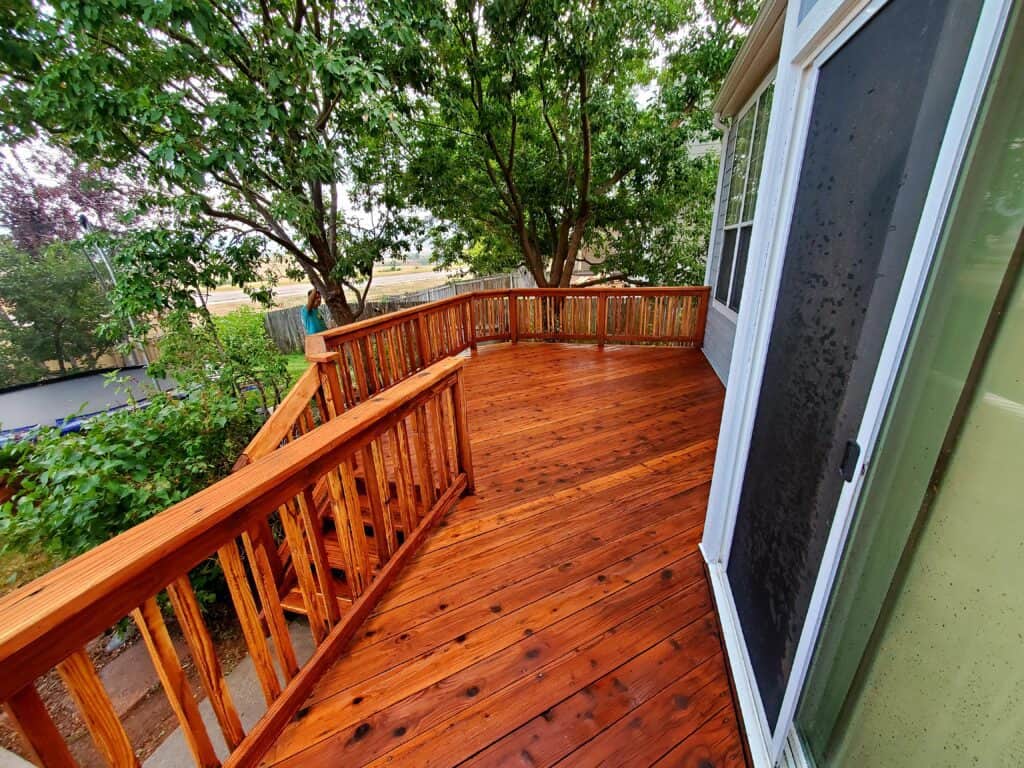Deck Pricing Guide in Denver Area
That new deck you’ve been dreaming of for quite some time is only a phone call away.
However, we understand that this is a big decision for any homeowner, and we want to make sure you’re as educated and confident in your decision as one could be.
The main component that will influence whether or not you’ll get a new deck built and installed is the price.
Hence, we’re here with an in-depth guide on deck pricing in the Denver area, what influences it, and how to get started with your deck project.
So, let’s get into it!
Quick Summary
Most new decks will cost anywhere between $20 and $60 per square foot. The main factors that influence these costs are the materials of deck you're installing (wood, composite, vinyl), deck size, deck complexity (multiple levels, built-in furniture, custom railings), labor, existing landscape of your yard, and permitting.
What Determines the Cost of a Deck?
There are multiple factors that influence the costs of a new deck you wish to install.
We’ll start off this guide by going over each deck pricing factor and then giving the average pricing for the most common decks homeowners install.

Materials
First, we will start with the material. Obviously, the quality and rarity of the material determine the price, and the three materials that are mostly used for deck building are wood, composite, and vinyl.
Wooden Decks
The price of the wooden deck is dictated by the wood’s type. It can go anywhere from $3 up to $25 for more premium options. More concretely, the price table would look like this:
Wood type | Price ranges in $ per square foot |
Pressure-treated wood | 3-7 |
Bamboo | 3-8 |
Cedar | 4-8 |
Mahogany | 8-12 |
Redwood | 5-25 |
Ipe | 10-20 |
As you can see, there are a variety of options, and these are just some of the most popular ones.
Composite Decks
Composite decking is a great alternative to wood, growing in demand every year.
When you compare it to wood, it would be like comparing an artificial flower to a real flower (wood is the real flower in this comparison).
However, composite decks last longer than wooden ones, and they are more resistant to environmental conditions such as rain, high humidity, and insects. Of course, with the quality comes the price; composite decking is more expensive than wood.
The average price for composite deck material is anywhere from $20 to $90 per square foot. The labor for composite decking is also more expensive, ranging from $20 to $60 on top of the costs of the materials.
Composite decking might seem overpriced, but its longevity and the lack of need for follow-up actions (sanding, staining, and sealing) make up for the high pricing in the long run.
Vinyl Decks
Although composite decks look like wood, have more longevity, and require less maintenance, all of these features have their drawbacks, mostly the price.
The solution for this is a vinyl deck. Vinyl is more or less a PVC material (similar to the ones that go in your window frames). Basically, it is plastic, and although it doesn’t look like wood and doesn’t give the sense of that aesthetic, it is quite practical.
It’s very easy to maintain, and won’t rot or decay under different weather conditions. The thing that you must keep in mind here is the quality of the vinyl. Similar to wood, there are different qualities of vinyl and also different qualities of work.
A badly installed vinyl deck will soon collapse under the weight and you will soon start facing broken planks, under which your chair and foot will sink.
The price range for vinyl decks is from $10 to $20 per square foot. More affordable than composite, yet coming with it’s benefits of low maintenance.

Deck Size
When it comes to deck size, the equation is very simple.
The bigger the deck, the higher the price.
A deck made from average material with a non-complex structure, with a size of 80 square feet, would cost approximately $2000-$4000 to build.
Something similar but three times that size would be approximately from $7000 all the way to more than $12000.
Deck Complexity
The complexity of the deck includes all of the add-ons that you will have on your deck.
Everything counts, including multi-level structure, built-in furniture, stairs, railing, etc.
This factor has two dimensions that you need to consider.
The first one is the price of the add-on to your deck as well as the price of installation, and the second one is the complexity of making it possible to be a part of your deck.
The more complex and the sophisticated process of installation and building, the more it will cost.
Labor
The labor is a huge part of the pricing, obviously.
Composite decking labor is more expensive than wood and vinyl decking labor.
Put it this way – the harder the job, the higher the costs. A job’s difficulty is determined by all of the factors we’ve previously outlined.
Labor costs start at $15 per square foot and go up from there.
Existing Landscape
Obviously, the deck must occupy some space.
In the ideal scenario, that would be flat land or concrete in front of your house, but this is not always the case.
Usually, the field needs adaptation, such as cutting the bushes and other vegetation that grows there, then making it completely flat, or even demolishing some existing structures.
Anything that is in a place where the deck will be, must be removed. The more complex this removal is, the higher costs.
Permits
This is a part where we advise you not to build a deck yourself. We get it, the pricing may have discouraged some of you, leading you to decide to DIY your deck.
But even if you are handy and skilled with housework and this may seem like an easy task for you, you can get yourself into trouble.
Even though smaller decks in Denver don’t require a permit, be careful there since you can’t be sure if it is “small enough.”
Any addition of gas, water, or electricity installation requires an official permit.
The price of a permit can be anywhere from $225 to $500.
The permit part of the deck-building process is usually something that burdens people the most, which is expected because it includes a lot of bureaucracy that no one likes.
Conclusion
In summary, all we can say is that building a deck and estimating its price is a multi-dimensional challenge.
The first thing is that you must have a bigger image when estimating the price of deck installation. Labor can even sometimes outstrip the costs of the material, so take all the criteria, such as size, complexity, and landscape, into account.
Also, this goes without mentioning, but be ready to pay for quality, and trust us, it pays off!
In the end, all we can say is give My Dee’s Decks n’ Ducts a call. First, we will provide you with diagnostics, consultations, and analyses of your needs, and afterward, we will carefully determine the cost estimation of having that wonderful deck as an inseparable part of your house.
Our Service Areas
Sheridan, CO
Highlands Ranch, CO
Arvada, CO
Get Your Quote Now!
Join over 100 happy homeowners in the Denver metro area who have entrusted us with their deck building projects!

Jill M.
"Sam was great to work with. Helped us to find some creative solutions and got the work done in the time quoted. We had to pivot a bit during the project and Sam was willing to make necessary adjustments. I appreciate a hard worker with attention to detail!"
